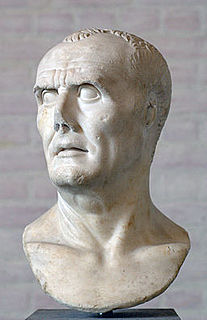Related Research Articles

The censor was a magistrate in ancient Rome who was responsible for maintaining the census, supervising public morality, and overseeing certain aspects of the government's finances.

Fides was the goddess of trust and good faith in Roman paganism. She was one of the original virtues to be considered an actual religious divinity. Fides is everything that is required for "honour and credibility, from fidelity in marriage, to contractual arrangements, and the obligation soldiers owed to Rome." Fides also means reliability, "reliability between two parties, which is always reciprocal." and "bedrock of relations between people and their communities", and then it was turned into a Roman deity and from which we gain the English word, 'fidelity'.

Lucius Cornelius Scipio Asiaticus was a general and statesman of the Roman Republic. He was the son of Publius Cornelius Scipio and the younger brother of Scipio Africanus. He was elected consul in 190 BC, and later that year led the Roman forces to victory at the Battle of Magnesia.
Manius Valerius Maximus Messalla was Roman consul in 263 BC.
The equites constituted the second of the property-based classes of ancient Rome, ranking below the senatorial class. A member of the equestrian order was known as an eques.

The vigintisexviri were a college (collegium) of minor magistrates in the Roman Republic. The college consisted of six boards:
Publius Rutilius Rufus was a Roman statesman, soldier, orator and historian of the Rutilia gens, as well as a great-uncle of Gaius Julius Caesar. He achieved the highest political office in the Roman Republic when he was elected consul for 105 BC.

Aerarium, from aes + -ārium, was the name given in Ancient Rome to the public treasury, and in a secondary sense to the public finances.
An evocatus was a soldier in the Ancient Roman army who had served out his time and obtained an honorable discharge but had voluntarily enlisted again at the invitation of the consul or other commander.
A pledge is a bailment that conveys possessory title to property owned by a debtor to a creditor to secure repayment for some debt or obligation and to the mutual benefit of both parties. The term is also used to denote the property which constitutes the security. The pledge is a type of security interest.
During the Roman Kingdom, Roman Republic and later, adlecti, or allecti were those who were chosen to fill up a vacancy in any office or collegium, and especially those who were chosen to fill up the proper number of the senate. As these would be generally equites, Festus defines the adlecti to be equites added to the senate: and he appears in this passage to make a distinction between the adlecti and the conscripti. This distinction is supported by the summons form used to call the senate which reads pares and conscripti beginning in 509 BC. Others argue that they were the same; for in another passage, Festus gives the same definition of the conscripti as he had done of the adlecti, and Livy (ii.1) says conscriptos in novum senatum appellabant lectos.

In ancient Roman religion, a sacellum is a small shrine. The word is a diminutive from sacrum. The numerous sacella of ancient Rome included both shrines maintained on private properties by families, and public shrines. A sacellum might be square or round.
The equus publicus was an honourable status in ancient Rome, granting its holder a military horse paid for by the state, along with the cost of its fodder for its whole life. The money for the horse was called aes equestre, whilst the annual money for the horses provisions for a year was called aes hordearium.
The gens Cottia was a plebeian family of equestrian rank. It is known chiefly from the brothers Marcus and Publius Cottius, equites of Tauromenium in Sicily. They served as witnesses against Verres.

Francis Bugg (1640–1727) was an English writer against Quakerism.
Publius Cornelius Anullinus was one of the generals of the Roman emperor Septimius Severus. He was from the city of Iliberis, and, while there is no clear information around this, it is believed he was not of a patrician family but was one of the equites.
The aes uxorium was a Roman tax paid by those who reached adulthood without marrying, with the exception of the Vestal Virgins.
The aes hordearium was an annual allotment of 2000 asses paid during the Roman Republic to an equus publicus for his military horse's upkeep. This money was paid by single women, which included both maidens and widows (viduae), and orphans (orbi), provided they possessed a certain amount of property, on the principle, as Barthold Georg Niebuhr remarks, "that in a military state, the women and children ought to contribute for those who fight in behalf of them and the commonwealth; it being borne in mind, that they were not included in the census." The equites had a right to distrain if the aes hordearium was not paid.
Publius Aelius Crispinus was a Roman eques who held a number of appointments in the second century AD. He is known from a series of inscriptions.
References
- 1 2 Livy; Foster, Benjamin O. (tr.). The History of Rome 1.43.8–10 . Retrieved Nov 9, 2019.
- ↑ Hill, H (1943). "Aes Equestre, Aes Hordearium, and Triplex Stipendium". Classical Philology. 38 (2): 132–134. doi:10.1086/362700. JSTOR 264298.
- 1 2 "LacusCurtius: How the Roman Army Was Paid (Smith's Dictionary, 1875)". University of Chicago . Retrieved 11 Nov 2019.
 This article incorporates text from this source, which is in the public domain .
This article incorporates text from this source, which is in the public domain .